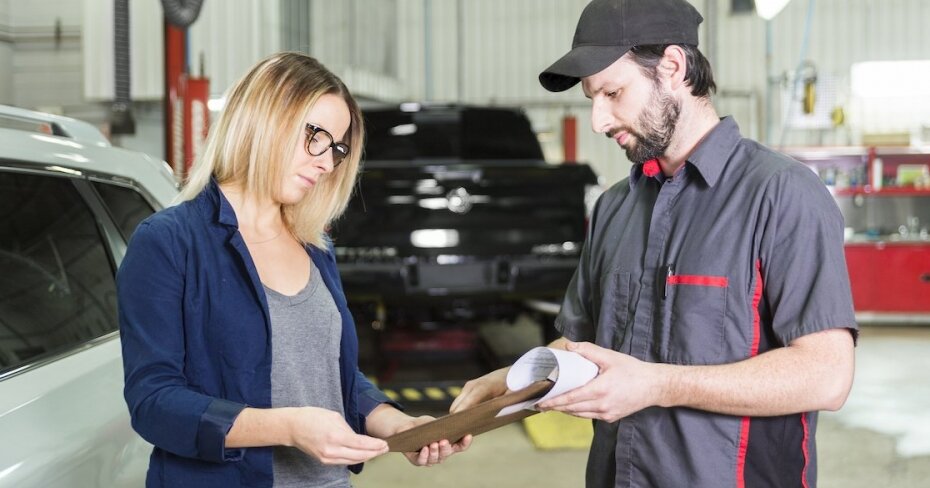Why women get charged more for car repairs than men
By: Lisa Coxon on April 17, 2019
Lori Johnson is really good at being a fly on the wall. During her 31 years as a Pennsylvania-based automotive technician, she’s had the opportunity to observe some pretty interesting behaviours.
Like the time she was completing her undergraduate degree in Women’s Studies and Sociology and writing a research paper on how women are treated in automotive stores. To find out, she asked an auto parts store if she could just hang out for the day. Without telling the employees what she was up to, Johnson watched. Did women beeline it for the counter and ask a technician for help, or did they look around for a while and try to find the part themselves?
“Women tended to ask questions and go right up to the counter,” she recalls. “They didn’t know where to look and they didn’t really know what they were looking for.”
Then there was the time Johnson was working at a Honda dealership and helped teach an informational class to new car buyers, both male and female. During one of the classes, she took a step back and noticed that the men were super involved but the women weren’t really engaged.
“They were taking notes feverishly in the back,” says Johnson, “but they weren’t asking questions.”
Johnson’s anecdotes are revealing. Women don’t want to look silly in front of men around cars — and as a result, won’t take steps to educate themselves. But what does this intimidation cost them?
How gender affects car repair quotes
In 2013, three researchers at Northwestern University’s Kellogg School of Management set out to understand how one’s knowledge of auto repair costs would affect the quote they were given by auto repair shops. In other words, would consumers be treated differently based on how well-informed they appear to be?
The researchers conducted a field experiment where, over a period of 16 weeks, male and female callers requested price quotes for a radiator replacement on a 2003 Toyota Camry LE from a variety of local car repair shops (both independent shops as well as chain affiliates).
Their study, Repairing the Damage: The Effect of Price Expectations on Auto-Repair Price Quotes, was published in 2017 and revealed that auto repair shops did indeed change their quotes depending on how well-informed the caller appeared to be about the cost of the radiator replacement.
“Our conditions were all about whether or not you signal or inform the seller that you know the correct price, or you have no idea about the price,” says Ayelet Israeli, one of the researchers, and now an assistant professor of business administration at Harvard Business School.
“We expected the main action to be around just the price knowledge that you communicate and not necessarily around gender.”
But then something happened: when both male and female callers presented no knowledge of what the repair should cost and appeared uninformed, the female callers were quoted higher prices on average — about $20 more than male callers who also appeared uninformed.
“That’s when gender became an interesting thing to look at,” says Israeli. “Because the reason for that was gender differences.”
By forfeiting knowledge so they don’t look stupid in front of men, women might be saving face, but they’re not saving money.
Do higher quotes also mean higher final costs?
A similar study was done in the U.K. in 2015 by ClickMechanic, an online mechanic booking service, and revealed that women are quoted up to 30% more for car repairs than men are. Like the Kellogg study, ClickMechanic had mystery callers reach out to independent car repair shops in Britain’s 10 biggest cities and receive quotes for a clutch replacement in a 2011 Ford Focus. It found that “a female premium” existed in eight of the 10 cities.
So, if we know that women are quoted higher prices on average when they appear uninformed, what happens when it comes to the final cost of repairs? Do they actually get charged more than men, too, when it comes time to pay up?
Neither the Kellogg study nor the ClickMechanic study looked at final costs — only quotes — but it’s not unreasonable to expect that in instances where women are given higher quotes than men, they would probably also see higher final prices, too.
“Prior research shows that [quotes] are pretty correlated with the final price,” says Israeli. “So I would conjecture that you would get prices that are correlated. On average, if women don’t have information, they will probably get higher final pricing and not just a higher quote.”
By forfeiting knowledge so they don’t look stupid in front of men, women might be saving face, but they’re not saving money
Does this mean women are being taken advantage of just because they’re women?
Well, it’s complicated. “Any human uses the signal available for him in any particular situation,” says Israeli. “So in this case, our finding is that when you signal that you don’t have any additional information, the only information car repair shops can go on — or the only thing they learn from the exact same conversation — is gender.”
What it really comes down to, then, is presumed knowledge and stereotypes, and how the two interact. For instance, when women present no knowledge of what a car repair should cost, it reinforces the widely held stereotype that women don’t know anything about cars. This then becomes the only thing the repair shop employee has to go off of — that’s their “signal” — and that’s when it appears to become about gender. A seemingly uninformed woman reinforces the uninformed stereotype, and it’s in this situation that car repair shops believe they can extract more value from the negotiation.
“They use that as their only signal and say, ‘well women know less, they’re probably not as adept in figuring out the correct price or knowing exactly what the problem is, so we can quote a higher price,’” says Israeli.
Johnson agrees. “If you go in to a car repair shop and you say, ‘well my thingamajig is making noise,’ that person has already put you on a level and it’s not a good one,” she says.
But it really just comes down to people working with the information they’re given. By no means is every car repair shop intentionally waiting for women to come in so they can charge them more for repairs.
“There’s a difference between an average repair man just using the gender signal to change prices to extract more value and a malicious repair person that starts telling you there are problems in your car that don’t even exist,” says Israeli.
“I’m not even thinking about those kind of people. I’m just assuming we’re in an environment where everyone is honest but they’re trying to extract more value from consumers if they can.”
It pays — literally — for women to be informed
The more striking finding of these experiments is that when women presented any kind of price knowledge, gender differences disappeared.
“The positive spin of our research is that once you have knowledge — any minimal knowledge — then you are treated exactly the same as a man, which is where I think the surprise is,” says Israeli. As well, female callers were better at negotiating the quoted price down and were more likely to receive a price concession than the male callers.
The best way for women to avoid being quoted higher prices for car repairs, then, is to educate themselves and see the call as a negotiation. Both Israeli and Johnson commented on how readily available car repair information is online, and that women should use it to their advantage.
“When you’re growing up and you’re a female, you’re told ‘call dad,’” says Johnson. “You’ve got your licence, you just go drive, here’s AAA or your parents’ phone number or somebody male usually in your family who will come and get you, change your tire or help you.”
Johnson wanted to do something about that, which is why, in 2006, she started Ladies, Start Your Engines — a two-hour all-female automotive class that teaches women light maintenance activities, like how to change a flat tire, check their oil and other fluids, or replace their wiper blades.
“For everything that I teach, all the tools are what’s already in your car,” says Johnson. “I could do this in your driveway. I’m not teaching you how to do anything super mechanical. I’m just showing you the kind of things that you can do on your own vehicle with what you have.”
Johnson has seen women of all ages at her class, which she takes on the road to places like California, Florida, and Massachusetts, and to all kinds of audiences, including Girl Scouts of America, General Motors and Volkswagen dealerships. The demographic of her classes generally tends to skew older, however, with most attendees being women between the ages of 45 and 60 — something Johnson attributes to no longer having a male figure in their life.
The positive spin of our research is that once you have knowledge — any minimal knowledge — then you are treated exactly the same as a man
“I’m seeing a lot more single women,” says Johnson, “whether they're divorced or choose not to be married or their husband has passed away and now they have no idea what to do because that male figure took care of everything.”
The number one reason women tell Johnson they take her class is because “they feel they don't know enough about their vehicles to talk intelligently to the service person,” she says. Johnson believes all new drivers — male and female — should have to take a basic automotive class before getting their licence. But women especially would be wise to educate themselves on basic terminology and repairs because, as the Kellogg study shows, just showing some kind of understanding can make all the difference.
In fact, one of Johnson’s favourite things to do is to share with the women in her class this little nugget of advice for when maintenance or repair involves taking the tires off:
“I teach them that when you take tires off and put them back on, the lugnuts need to get torqued on to a certain torque and you can’t just use an air gun,” she explains.
“So when they’re at the mechanic having their wheels rotated or what have you, I tell them to turn to the technician as they’re walking away and say, ‘Oh, and you do use a torque wrench to put those lugnuts on, right?”


